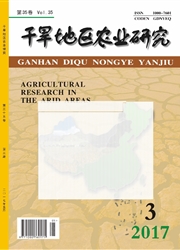

 中文摘要:
中文摘要:
为了分析不同灌溉方式的节水效果和作物对不同灌溉方式条件下的生理响应,通过对温室甜椒进行常规灌溉(GI)和分根交替灌溉(APRI)的试验,分析了不同灌溉方式对甜椒叶片光合特性、水分参数、叶绿素相对含量(CC)、根冠比(R/S)和根系导水率(RHC)的影响,以及不同灌溉方式甜椒对水分胁迫和复水的生理响应。试验结果表明:分根交替灌溉处理能够有效地调节气孔开度,减少无效蒸腾失水,比常规灌溉处理节水25.93%,WUE、叶片细胞液浓度(CSC)、叶绿素相对含量(CC)和R/S分别提高了3.19%、6.56%、8.04%、15.38%,RHC减小了3.01%。两种灌溉方式受水分胁迫复水后都表现出叶片光合速率(Tr)、水分饱和亏(WSD)、CSC值下降,叶鲜重含水率(FWC)值上升,且分根交替灌溉甜椒(APRI)对水分胁迫和复水都具有更优的生理调节功能。
 英文摘要:
英文摘要:
In order to analyze the water saving effect and physiological response for different irrigation methods , through the experiment of general irrigation (GI ) and alternate partial root-zone irrigation (APRI ) of greenhouse cap-sicum ,analyzed the effects of different irrigation methods to the photosynthetic characteristic ,water parameter ,CC ,R/S and RHC of capsicum leaves and physiological responses of water stress and rewatering .The test results showed that :The APRI treatment can be effectively adjusted the stomatal open degree ,reduced the invalid transpiration ,saving water was 25 .98% .Comparing with the GI treatment ,the WUE ,CSC ,CC and R/S increased by 3 .19% ,6 .56% ,8 .04% , 15 .38% .While the RHC was reduced by 3 .01% .After water stress and rewatering ,these two irrigation methods total shown the Tr ,WSD and CSC decline ,while FWC ascend .Also the alternate partial root -zone irrigation (APRI ) for capsicum has better physiological regulating function for water stress and rewatering .
 同期刊论文项目
同期刊论文项目
 同项目期刊论文
同项目期刊论文
 期刊信息
期刊信息
